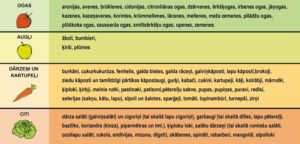VAT on fruits, vegetables and berries reduced from January 1
From January 1, 2018, a reduced value added tax (VAT) rate of 5% is being introduced for the following food products (fresh fruits, berries and vegetables):
To enlarge the image, click on it!
The VAT 5% rate will only apply to fresh products, including washed, peeled, shelled, cut and packaged products, but not to products that have been thermally or otherwise processed. This means that the reduced rate will also apply to peeled, cut potatoes in vacuum packaging or pre-packed, cut cabbage and carrots in packaging. However, neither frozen, nor canned, nor salted, nor pickled, nor dried fruits, berries or vegetables are eligible for the application of the VAT rate 5%. The reduced rate will not be applicable to, for example, sauerkraut, pickled or salted cucumbers, boiled beets, dried fruits, fresh carrot salad with added spices and oil.
The VAT 5% rate will be applied to the listed fruits, berries and vegetables, regardless of their further use. This means that potatoes intended for animal feed or apples supplied to beverage factories or fresh mint supplied to cosmetics factories will be able to apply the reduced VAT rate.
The VAT 5% rate should be applied to all products on the list, regardless of their country of origin, for example, the reduced 5% rate will also be applied to apples from Poland or the Netherlands, as well as cranberries grown in the USA or garlic grown in China.
The VAT 5% rate will not apply to fruits, berries and vegetables that are not grown in Latvia (for example, bananas, tangerines, lemons, sweet potatoes), as well as to products that are grown in small quantities (for example, watermelons, melons, grapes, paprika, mushrooms).
One of the goals of introducing the VAT 5% rate is to make fresh and regionally specific food products more accessible to consumers. By including more fruits, berries and vegetables in their diet, everyone has the opportunity to live healthier. In addition, the reduced VAT rate will promote the competitiveness of Latvian vegetable and fruit producers and increase the purchasing power of the population, as well as reduce illegal trade in these food products.
Source: Ministry of Agriculture


